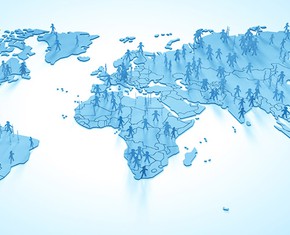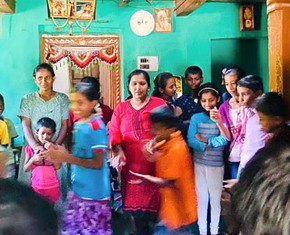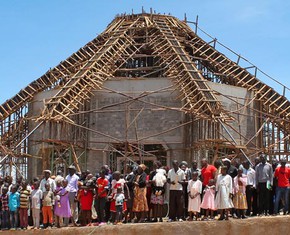[This article, the final part of a statement called Shared Vision, Shared Volition: Choosing Our Global Future Together, comes from the Baha’i International Community, and is addressed to the United Nations Climate Change Conference in Paris, France. Quotes from the Baha’i teachings have been added.]
Raise ye a clamour like unto a roaring sea; like a prodigal cloud, rain down the grace of heaven. Lift up your voices and sing out… Quench ye the fires of war, lift high the banners of peace, work for the oneness of humankind and remember that religion is the channel of love unto all peoples. Be ye aware that the children of men are sheep of God and He their loving Shepherd, that He careth tenderly for all His sheep and maketh them to feed in His own green pastures of grace and giveth them to drink from the wellspring of life. Such is the way of the Lord. Such are His bestowals. Such, from among His teachings, is His precept of the oneness of mankind. – Abdu’l-Baha, Selections from the Writings of Abdu’l-Baha, p. 36.
The principle of the oneness of humankind has implications for relationships at all levels. Individual choices and governmental action are often subtly placed in opposition to one another, suggesting that one or the other either takes or deserves precedence. In reality, of course, both are needed. Agreements and protocols at the governmental level will not be sufficient if individuals do not adopt more sustainable lifestyles and behaviors. Similarly, individual actions alone, such as conserving water and reducing waste, for instance, will not be sufficient if governments do not make the necessary changes at the structural level. Also crucial is the community which, as a distinct unit of civilization with its own capacities and qualities, has a unique and vital role that cannot be overlooked. Increasing integration between these three levels will be needed, if long-lasting progress is to be achieved
What might this look like in practice? Consumption habits provide a helpful illustration. People might be open to recycling, for example, but live in areas without services such as drop-off centers or community composting. Without appropriate supports from government, then, possibilities for individual change are severely constrained. Institutional action to create an enabling environment is needed. Government has a vital role to enact the policies, laws, and regulations needed to support the desired actions and behaviors.
This framework, however, merely sets the stage. For ultimately it is individuals who take the initiative to adopt new patterns of action or continue with business as usual. Human behavior and personal decision-making are therefore critical to the success of sustainability efforts, particularly in the sphere of values, ethics, and morals. Such qualities might seem diffuse or somewhat “soft”, but changes in lifestyle will not be sustained if normative drivers of behaviors such as attitudes and beliefs do not shift as well. Consumption habits will not change if acquisition and the ongoing accumulation of luxury goods are seen as powerful symbols of success and importance. Building more sustainable patterns of life will therefore require continuing conversation about human nature and the prerequisites of well-being.
How do such conversations arise? Government can contribute, through educational outreach and efforts to build commitment among stakeholders. But the community has a vital role to play in allowing for dialogue about choices and behavior. Are municipal or provincial policies on water conservation welcomed as progress or treated as an unnecessary hassle? Are collective decisions about infrastructure informed by a shared vision of the future or do individuals mostly look out for themselves? The qualities of culture that inform questions such as these arise within the context of community. The community can provide an arena in which numerous participants, backgrounds, talents, and efforts combine to achieve change and progress. It also provides a key space in which consensus on shared goals and objectives can be reached and a common vision of the future built among a population. The growing list of cities taking far more robust action than their national governments on climate issues is just one example of the power inherent in a community that is able to pursue a common purpose through coordinated efforts.
Exploring new patterns of interaction among the actors of society, such as individuals and institutions, will be central to the task of building more sustainable relationships with the natural world and among various segments of the global family. The work of addressing global climate change ultimately revolves around the aim of human lives well lived, which is a goal cherished by people and cultures the world over. In it can therefore be found a powerful point of unity to support the work ahead. We trust that the efforts of those at COP 21 will contribute to building a firm foundation on which the well-being and prosperity of humanity can be ever more effectively pursued for this and future generations.
















Comments
Sign in or create an account
Continue with Googleor